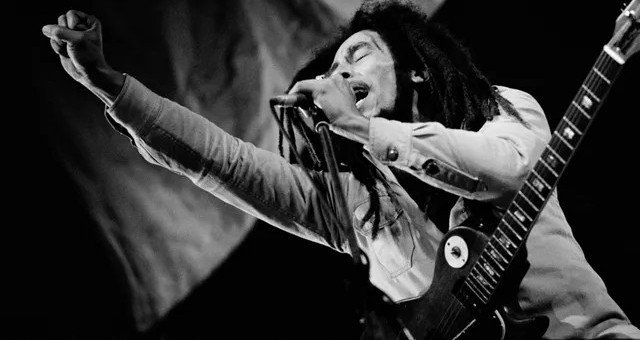Bob Marley
Source: Africa Publicity
In the town of Kisumu, Kenya, an old radio played a song that had stirred emotions for generations. The song, “Wimbo wa Uhuru,” was a call for freedom and justice, a beacon for the oppressed during the colonial era. It was a protest song, a powerful tool used by the people to voice their demands for independence and equality. The song’s relevance had not waned over the years; it remained a testament to the resilience and spirit of the people.
Protest songs have a unique place in history, transcending borders and cultures. In Soweto, South Africa, another iconic song, “Soweto Blues,” echoed through the streets during the apartheid era. Sung by the legendary Miriam Makeba, it highlighted the struggles of the black population against racial segregation. The lyrics painted a vivid picture of the brutality faced by the people, galvanizing international support for the anti-apartheid movement. The song became a symbol of resistance, uniting people in their fight for justice.
Across the continent, in Lagos, Nigeria, Fela Kuti’s “Zombie” resonated with the masses. Fela, a pioneer of Afrobeat, used his music to criticize the military government. His lyrics, though often humorous, were scathing and direct, calling out the oppressive regime. “Zombie” likened the soldiers to mindless robots, blindly following orders without questioning their morality. The song sparked outrage among the authorities, leading to Fela’s arrest and the destruction of his home. Despite the personal cost, Fela’s music inspired many to stand up against tyranny.
In the bustling city of Dakar, Senegal, Youssou N’Dour’s “New Africa” captured the hopes and dreams of a continent striving for progress. The song envisioned a united Africa, free from the chains of colonialism and internal strife. N’Dour’s powerful voice and evocative lyrics urged the people to embrace their cultural heritage and work towards a brighter future. The song became an anthem for pan-Africanism, fostering a sense of pride and unity among its listeners.
Moving north to Algiers, Algeria, the protest song “Ya Rayah” by Dahmane El Harrachi struck a chord with many. It spoke of the pain and disillusionment experienced by those who had emigrated in search of a better life. The song’s melancholic melody and poignant lyrics resonated with the diaspora, highlighting the emotional toll of leaving one’s homeland. “Ya Rayah” became a rallying cry for change, urging leaders to address the issues that forced people to flee their countries.
In the heart of Ethiopia, Addis Ababa, the song “Tena Yistilign” by Tilahun Gessesse became a symbol of resistance during the oppressive Derg regime. Gessesse’s heartfelt performance and powerful message of peace and unity resonated deeply with the people. The song called for an end to violence and division, advocating for a harmonious and just society. Its influence was so profound that it became a staple at protests and rallies, embodying the collective yearning for freedom.
Traveling to Zimbabwe, the song “Chimurenga” by Thomas Mapfumo played a crucial role in the country’s liberation struggle. The term “Chimurenga” means “revolutionary struggle” in Shona, and Mapfumo’s music captured the essence of the fight against colonial rule. His songs, infused with traditional rhythms and instruments, rallied the people and bolstered their resolve. Mapfumo’s contribution to the independence movement earned him the nickname “The Lion of Zimbabwe,” and his music continues to inspire generations.
In Ghana, the song “Freedom” by E.T. Mensah became an anthem for the country’s quest for independence. Mensah, known as the “King of Highlife,” used his music to promote the ideals of liberty and self-determination. The song’s upbeat tempo and uplifting lyrics filled the air with hope and optimism, encouraging the people to believe in their ability to achieve sovereignty. “Freedom” played a significant role in galvanizing the masses, contributing to Ghana’s successful bid for independence.
The impact of protest songs extends beyond Africa. In the United States, the civil rights movement of the 1960s was marked by powerful anthems like “We Shall Overcome.” This song, originally a gospel hymn, was adapted by civil rights activists to symbolize their struggle for equality. It was sung at marches, sit-ins, and rallies, providing solace and strength to those fighting against racial injustice. The song’s simple yet profound message transcended cultural boundaries, becoming a global symbol of resistance.
Similarly, in Latin America, the song “El Pueblo Unido Jamás Será Vencido” by Quilapayún became an anthem for unity and resistance. Originating in Chile during the tumultuous political landscape of the 1970s, the song called for solidarity among the people in the face of oppression. Its powerful lyrics and stirring melody inspired many to join the fight for democracy and human rights, resonating across the continent and beyond.
The significance of protest songs lies in their ability to articulate the collective aspirations and grievances of the people. They serve as a voice for the marginalized, a means of expression for those who cannot speak out openly. Through music, individuals find a sense of belonging and empowerment, knowing they are not alone in their struggles.
In contemporary times, protest songs continue to play a crucial role. In Sudan, during the 2019 revolution, the song “Dum” by Sudanese-American rapper Oddisee became a rallying cry for change. The song’s powerful lyrics and infectious beat captured the spirit of the revolution, inspiring young and old alike to demand their rights. It demonstrated the enduring power of music as a tool for social and political change.
The societal relevance of protest songs is undeniable. They have the power to inspire, unite, and drive change. Whether in Africa, America, or anywhere else in the world, these songs serve as a reminder of the enduring human spirit and the relentless quest for justice and equality. Through their melodies and messages, protest songs transcend time and place, leaving an indelible mark on history.








